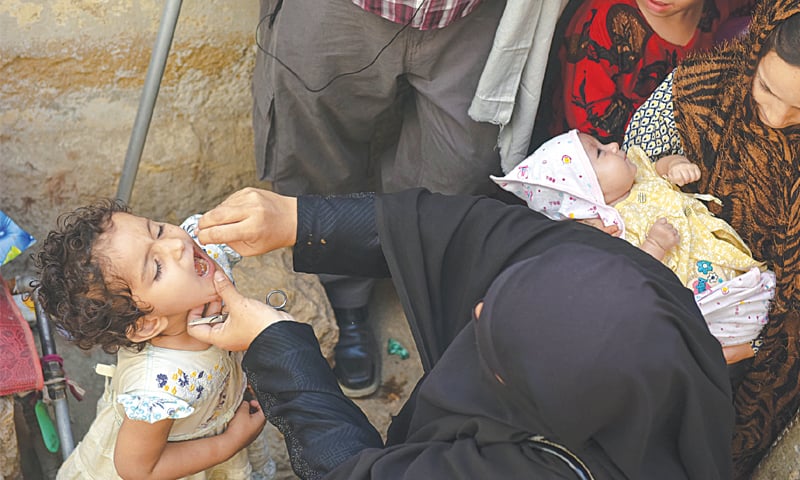EARLY in the morning on Wednesday, a group of women has gathered at a small private clinic in Kati Pahari. They have their bags ready with pamphlets, vaccines and a bottle of water.
Their supervisor starts making groups of four and sends them off with a security detail as they go door-to-door to vaccinate children under the age of five against the crippling polio virus.
Sometimes, people welcome them with open arms. Sometimes, they don’t.
Parents often refuse to get their children vaccinated because of religious reasons
So far, there are eight reported cases of polio in Pakistan this year. The past week, in particular, has been difficult for the women polio workers after a series of videos went viral on social media where a man claimed that children were complaining of being sick after being given the anti-polio vaccine. The man, who has been arrested, alleged that children were ‘fainting’ after they received a dose of the vaccine.
“Within a few hours of those videos circulating on WhatsApp and Facebook, there were certain areas which became inaccessible — easily 200 to 300 children if not more,” said a polio worker who has been with this team for the last three years.
“I was on my regular route when I came across a man who told his friend in Pashto that it was better to shoot us (polio workers) before we ruin their children,” she added.
“However, we persisted. We sat down with the community, had a consultation with the elders and a scholar and eventually were allowed to go ahead (although there were still a few refusal cases). There are days when we set out for a drive we feel that we will be successful and achieve our goals, some days it is just not possible,” she explained.
Another way these women counter propaganda videos such as the one from Peshawar is by using videos made by local influencers who advocate for the polio campaigns, and by holding awareness sessions a few days before the polio drives are scheduled to start.
“There are times we get scared of the work we do. People can be very difficult. We try to reason with them and say that we have been working in this area for two or three years, have you ever heard of any incidents or anything. Our families are always in stress because of what we do,” said another polio worker.
“Refusals are often based on religious reasons, or they will say that you are right but my heart just does not believe in this – they invite us to break bread with them but refuse to let us inoculate their children,” she told Dawn.
Her colleague, who was packing up to head out, shouted: “Some men threaten to divorce their wives if we vaccinate their children without their permission.”
“Women tell us that their husbands and in-laws beat them up if they even think about getting the polio drops for their children. In situations like this we get stumped,” she added.
Another polio worker with bright green eyes chimed in and said: “People have come to my house and started fights over the fact that I went to vaccinate their children. Thankfully, my husband and mother-in-law are always there for me and support what I do.”
Despite all these hurdles, this group of women continues their struggle.
“This area has a lot of families from Gilgit-Baltistan, Kohistan, Swat and other parts of the country. Our target for this drive is to inoculate at least 8,000 children at home and another 1,000 at schools or madressahs,” explained a polio worker before setting off into the narrow lanes of Umer Farooq colony.
“For families who have religious apprehensions over the drive or refuse any kind of vaccinations, we have a religious cleric with us at the centre at all times so they can address their concerns,” she added.
“There is a route here which we call 05. It is a steep climb up a mountain and for most part we have to crawl on all fours to get to the top. There are about 15 houses there and we have to go there at least three to four times a day if we want to give those children the polio drops,” said one of the oldest polio workers.
“The families will tell us the children are at school, or at their grandmother’s or to go get their fathers from the shop for permission etc. It is a brutal job but I feel that even if we get one of those refusals turned, we have done good work,” she added.
Published in Dawn, April 25th, 2019













































